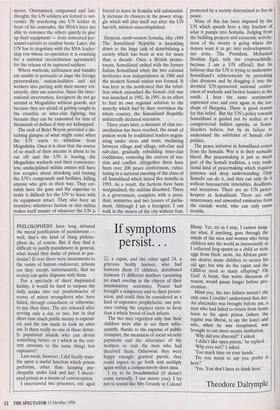If symptoms persist.. .
PHILOSOPHERS have long debated the moral justification of punishment well, that's the kind of thing philoso- phers do, of course. But if they find it difficult to justify punishment in general, what would they make of prison in par- ticular? If ever there were monuments to the vanity of human endeavour, prisons are they; except, unfortunately, that no society can quite dispense with them.
For a spectacle of sheer inspissated futility, it would be hard to surpass the daily intake into our penitentiaries of scores of minor wrongdoers who have failed, through cussedness or otherwise, to pay their fines. Thy are released after serving only a day or two, but in that short time much public money is expend- ed, and the law made to look an utter ass. Is there really no one in these dense- ly populated islands who can devise something better, or ( which in the con- text amounts to the same thing) less expensive?
Last week, however, I did finally stum- ble upon a useful function which prison performs, other than keeping psy- chopaths under lock and key: I discov- ered prison as a means of contraception.
I interviewed two prisoners, one aged 22, a rapist, and the other aged 24, a grievous bodily harmer, who had between them 15 children, distributed between 11 different mothers (assuming no exact overlap in the objects of their inseminatory activities). Prison had brought a temporary end to their procre- ation, and could thus be considered as a kind of expensive prophylactic: one pris- oner costing the taxpayer more to keep than a whole brood of Such infants.
The two men regretted only that their children were able to see them infre- quently, thanks to the expense of public transport, the meanness of social security payments and the reluctance of the mothers to visit the men who had deceived them. Otherwise they were happy enough: granted parole, they could expect to go forth and multiply again within a comparatively short time.
I try to be broadminded (it doesn't come naturally, I can assure you); I try not to sound like Mrs Grundy or Colonel Blimp. Yet, try as I may, I cannot imag- ine what, if anything, goes through the minds of the men and women who bring children into the world as insouciantly as I collected frog-spawn as a child or stole eggs from birds' nests. An African peas- ant desires many children to secure his old age; but why do the rapist and the GBH-er need so many offspring? Oh God! A beast, that wants discourse of reason, would pause longer before pro- creation.
Mind you, the two fathers weren't the only ones I couldn't understand that day. An absconder was brought before me, a man who had failed to return from home leave to his open prison (where the regime was liberal, to say the least) and who, when he was recaptured, was brought to our more secure institution.
`Why did you abscond?' I asked.
`I didn't like open prison,' he replied. `Why ever not?' I asked.
`Too much time on your hands.' `Do you mean to say you prefer it here?'
`Yes. You don't have to think here.'
Theodore Dalrymple


























































 Previous page
Previous page